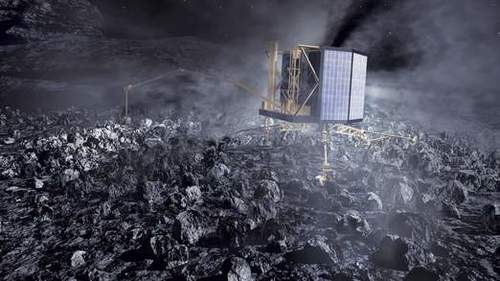'Hello, world!' - Rosetta Wakes Up!!
 On 20th January 2014, the space probe Rosetta woke up after being in hibernation for 31 months!
On 20th January 2014, the space probe Rosetta woke up after being in hibernation for 31 months!
Rosetta is currently 800 million kilometres away from Earth (near Jupiter) and over the next few months Rosetta will chase down a Comet known as 67P before harpooning the frozen ball of dirty ice and attempting to land on its surface.
Rosetta is currently nine million kilometres away from 67P , but by using its thrusters over the next 240 days she will close to within 1 0 km by the 15th September 2014.
If all goes according to plan, what will Rosetta's average speed in Km/hr relative to 67P need to be to achieve this?
(Assume Rosetta is in a straight line chase with 67P and that they are both traveling along the same vector.)
This section requires Javascript.
You are seeing this because something didn't load right. We suggest you, (a) try
refreshing the page, (b) enabling javascript if it is disabled on your browser and,
finally, (c)
loading the
non-javascript version of this page
. We're sorry about the hassle.
9 solutions
Discussions for this problem are now closed
I was fooled by the distance to the earth, I thought that I will need to calculate how much force the earth pulled two of them and make me forget to realize it is a simple question.
It's okay! we all commit silly mistakes!
yaa these are useless data,,,sometime given,inorder to confuse us
I answered by dividing Rosetta's distance on 15th of Sept. 2014 which is 9million - 10km= 8999990km to the conversion of hours in a 240 day w/c is exactly 5760 hr.
won't the comet move?
yes the comet moves...........thats why RELATIVE speed is to be calculated ,in which we can have the comet in reference position
Thats exactly what I was thinking
yeah, we never considered that!
din see the km/hr... :P was calculating the m/sec
1stly v need to see what v hv to find.. n 2nd wat is needed for the answer here v need to find the speed of rosetta so acc to formula s=d/t v need to knw the time (in hours as ques demands) and the distance travelled by rosetta i.e. 10km less in a million, so the equation becomes s = 9million km /240*24=1562km/hr
to be exact (9million km -10km)/240 days*24 =1562.49km/hr
why 240 times 24?
there are 24 hrs in one day, and there are 240 hrs. Therefore the total hrs is 24*240
ok thanks
somebody tell me hw it's 1562 in detail coz i never got diz that hw
1st calculate hw many days it take to reach ,just 10km near to that commet,,,ie between 20 jan to 15 sep,,,,,take care of days of feb,july and august,,,,then multiply it by 24,,,,ie....total day is 240 nw *24=5760hrs,,,,,nw deveide it to the distance
to find the average speed of any object related to any object , first divide the total distance=9000000 km with total time=(240X24)=5760hrs average speed=9000000/5760 =1562.5 km/hr
but....its said its relative avg speed with respect to 67p....dpn't we need the speed of 67P to find that and then subtract it????
Given that, Total distance from Rosetta to 67P is : 9,000000km -10 km = 8,999,990 km Time taken in hours: 240*24 =5760 hours
We know, Average Speed= Total Distance/ Time Taken Average Speed= 8,999,990/ 5760 = 1562.5 km/hr
So, the Average Speed= 1562 km/hr
exactly
yes,
yes
distance covered =9 1000000-10 km time taken =240 24 hrs so, average speed =distance/time=1562 km/hr
distance that would be travel = 8999990 time in hour = 240*24=5760 speed in km/hr = 8999990/5760 = 1562 km/hr
Putting the reference in 67P, everything happens as if the 67P probe was stopped and moving around in his direction. The average speed on the probe must maintain is given by (9000000-10) Km / (240 * 40) hr which is about 1562.50 km / hr.
Pondo o referencial no 67P, tudo ocorre como se o 67P estivesse parado e a sonda se locomovendo em sua direção. A velocidade relativa média que a sonda deve manter é dada por (9000000-10)Km/(240*40)h que é aproximadamente 1562,50 Km/h.
First you have to take 9,000,000 - 10. This will give you 8,999,990. Then you divide this integer by (240 x 24) which gives you the answer 1562
We have S = 9 0 0 0 0 0 0 − 1 0 k m and 2 4 0 days have t = 2 4 × 2 4 0 = 5 7 6 0 h
So the average speed of Rosetta is V = t S = 1 5 6 2 k m / h
okey, now i know.thx
range between Rosetta and 67P = 9,000,000 km
time which Rosetta will need = 240 days = 240 * 24 hours
Rosetta's avg speed is (in km/hr) :
9 , 0 0 0 , 0 0 0 / 2 4 0 . 2 4 = 1 5 6 2 . 5
okay its only a simple physics
u mean maths
I simply multiplied 24 Hours to 240 Days to get the Time needed to travel 9,000,000 KiloMeters and got 5760 Hours. Then I divided 9,000,000 Kilometers by 5760 Hours since the formula for speed is Distance dived by Time or d/t and got an answer of 1562.5 Kilometers per Hour.
Simple Physics: To find average speed, we just need to take the distance and divide it by the time.
Distance: 9 million Kilometres
Time: 240 times 24 = 5760 hours
9 million / 5760 = 1562 Km/Hr